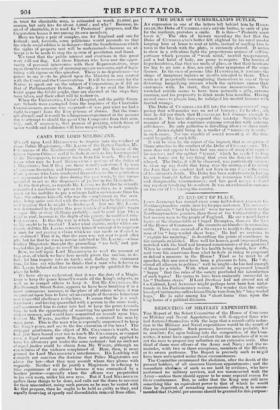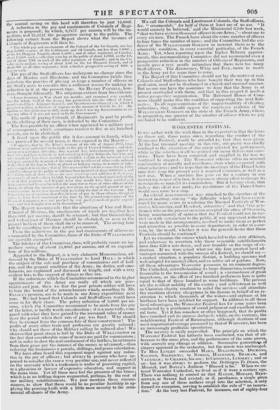REDUCTION OF MILITARY EXPENDITURE.
THE Report of the Select Committee of the House of Commons on Military and Naval Appointments will disappoint those who had flattered themselves with the hope that a considerable reduc- tion in the Military and Naval expenditure would be the result of the proposed inquiry. Such persons, however, are probably few in number; fir, upon looking into the composition: of the Com- mittee, it must have appeared evident that the members of it were not the men to propose any reduction on an extensive scale. One third of them were officers of the Army and Navy ; and the re- mainder, with two or three exceptions,emembers of the Ministry or its sworn partisans. The Report is precisely such as might have been anticipated under these circumstances.
Tile Committee recommend the abolition, after the death of the • present holders, of all sinecure Garrison appointments; and the immediate abolition of such as are held by civilians, who have perforthed no military services, and are unconnected with the Army—unless there should appear to be some especial reason for their continuance. • But, in order that the King may still have something like an equivalent power to that of which he would thus be deprived, of rewarding meritorious officers, it is recom- mended that 18,0001. per annum should be granted for this purpose: the annual saving on this head will therefore be just 12,0001.
A reduction in the pay and emoluments of Colonels of Regi- ments is proposed; by which, 9,767/. per annum will be the im- mediate, and 25,321/. the prospective saving to the public. The following extract from the Report shows what the incomes of Colonels of Regiments will then be.
" The whole pity and emoluments of the Colonel of the let Guards, not less than 3,0001. a year; of the Culdstmam and 3d Guards, not less than 2,000/. ; of the 1st Dragoon Guards, about 1,513,0/. ; and of other regiments of Cavalry, about 1,:3,501. each ;—etreeting a saving to the public of about 1,090/. on the 1st, ;cid of about 7201. on each of the other regiments of Guards; and in the Ca- , :ftv an inmediate saving of about 1501. on the 1st Dragoon Guards, and of F,I,,nt fin/. on all other regiments, with a further prospective saving of 1001. a ear on each.
The pay of the Staff-officers has undergone no change since the days of Minden and Blenheim; and the Committee (while they roprobate the practice of placing so large a number of officers on the Staff) seem to consider this a sufficient reason for making no reduction in it at the present time. Sir IIENnv PARNELL, how- ever, thought differently. We subjoinan extract from his evidence.
" I vas Secretary at War about ten months, and examined very carefully
the whole Staff of the Army; but particularly into the offices of Com- n. wder-in-Chief, Adjutant-General, and Quartermaster-General ; in which e:ieseil mains. reductions of expense to the amount of 8,8S71. 9s. 7d. 31y opinion on this point was so fully made up, that it was my determination to re- sign my oflice if it was- not acted on by the Government."
The mode of paying Colonels of Regiments in part by profits on the clothing of their men, is defended by the Committee!
The fees payable by an officer when appointed to a military post of consequence, whirl.: tiemetimes amount to five or six hundred pounds, are to be abolished. A fraud upon the public (for it does amount to fraud), which was practi,ed fir several years, is tints exposed. in the Report- " It: appears, that ioy the King's warrant of the tith of August 1514, large additions were authorized to be made to the pay of General Officers ; and that, owing to a u,i,taken bberality, dd.; on rant was indkerintinatelv applied to those te11,1 had lwen reduced, or had Ittircd un hail-pay before the List war, and wit would not have heen enabled to estalolish a claim to the increased tata of half p T. granted by WZ!ITant of the saw date to officers of other ranks reduced at tit:• close of tie war in Is1-1, or illaccol uu half-pav owing to wounds or infir- mities acquired in se:vice; that if this iron r:i,1 had not bias caireeNd in 1.--48, a fin tiler yhargg,to tin' public would have been incurred of about :3011,coof. ;
101;:ethirty-nilworticareithwrmleivsnehaddifir./9/!,;rprq,
at an exec- no h.,: than I5,67231. beyond what they received previalisiv to the issue of that warrant, ;mot beyond what they would have been entitled to if their servios s had bean sulojected to the saute test as those of other officers of the Amy, to whom the increase of pay was given, on the special ground of uteri- torioins seta ice in the war inunedettely ptceeding the date of the wrrant. The Committee ara of opinion, that this increase of pay to those officers, though it :woos to lave haan sanctioned at the time by the general concurrence of the Ifeme of Conntuons, was not justifird by any good'grounds of public expedi- ency. and hat it ought now to be discontinued."
The Report recommends that the situations of Vice and Rear- Admiral of Marines, the emoluments of which are together less limn situ/. per annum, should be retained ; but that Generalships glad t uliitcicieg of Marines should be abolished, as soon as the present holders of them shall die or be removed, The saving here 1611 be something less than 4,0001. per annum. From the reductions in the pay and emoluments of officers re- conunentled by the Committee, those of the Duke of WELLINGTON arc specially exempted. The labours of the Committee, then, will probably create an im- mediate saving of about 25,0001. per annum, out of an expendi- ture of five millions.
Appended to the Report, is a very elaborate Memorandum, ad- dressed by the Duke of WELLINGTON to Lord HILL ; in winch the subject of the sale and purchase of commissions and of half- pay, and the general condition of the Army, its duties, and emo- luments, are explained and discussed at length, and with a very evident bias to the support of things as they are.
If the reductions which the Committee recommend in the higher appointments of the Army are really all which are prac- ticable anti j.ust, then we fear the poor private soldier will have to bear the brunt of the retrenchments which, accordino. to Mr. ELLicres promise, are to be made in our Army expenditure next year. We had hoped that Colonels and Staff-officers would have come in for their share. The paltry reduction of 9,0001. per an- imm, which the Committee recommend to be made from the pay of the latter, is hardly worth consideration ; it is a mere trifle, com- pared with what they have gained by the increased value of money since the period when their rate of pay was fixed. 'Why should they be exempt from the common fate of their countrymen? The profits of every other trade and profession are greatly reduced ; why should not those of the Military calling be reduced also? We observe that great stress is laid by the Duke of WELLINGTON on the fact that considerable sums of money are paid for commissions ; and in order to show thereat emolument of the holders, he subtracts from their gross pay the interest of the money so advanced,—thus reducing the business to a pounds, shillings, and pence calculation. We have often heard this argument urged against any reduc- tion in the pay of officers; but always by persons who have ap- peared to consider the case a very peculiar one, and never reflected on the necessity which a tradesman is under of procuring capital, or a physician or lawyer of expensive education, and support in the mean time. Yet all these men feel the pressure of the times; which is in no trifling degree augmented, perhaps, by the cost of our military establishments. We just mention these circum- stances, to show that there would be no peculiar hardship in ap- plying the pruning-knife with a little more severity to the orna- mental off-shoots of the Army. We call the Colonels and Lieutenant-Colonels, the Staff-officerg. &c. " ornamental; " for half of them at least are of no use. "It would scarcely be believed," said the Ministerial Globe last week, " that we have sixteen thousand officers in our Army,"—about one to every six men. The French have about the same number of officers to four times the number of men ; and the Committee had the evi- dence of Sir WILLOUGHBY GORDON to instruct them as to the admirable condition, in every essential particular, of the French Army. Yet, when reporting upon the higher Military appoint- ments, this accommodating Committee did not recommend even a prospective reduction in the number of Officers of Regiments, and merely gave a very gentle intimation that there were too many Staff-officers. The Aristocracy, Whig and Tory, mean to nestle in the Army yet for some time to come.
The Report of this Committee should not lay the matter at rest. Colonels and Staff-ollicers who have bought their way up in this profession, need not be discharged in a harsh and unusual manner. But no one can have the assurance to deny that the Army is at present overloaded with them, and that in this respect it needs a better prospectire organization. The Reformed House of Com- mons should make this the condition of supporting the next Esti- mates. To all representations of the impracticability of effecting reductions, they should oppose the conclusive evidence of Sir Wit.i.onoRBY Gonna?: on the state of the French Army, where, in proportion, one quarter of the number of officers whom we pay are found to be sufficient.



















 Previous page
Previous page